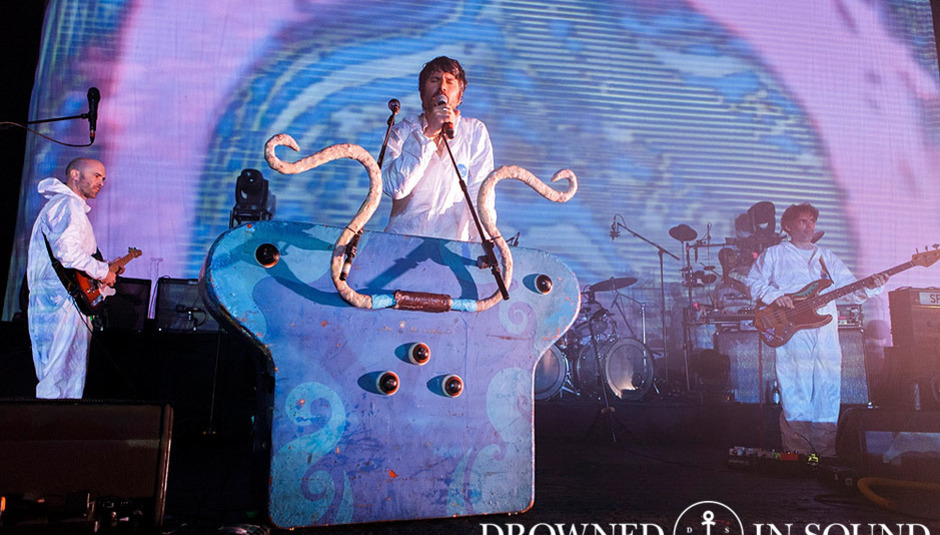Super Furry Animals can lay claim to being one of the most innovative bands on the planet since forming in 1993. With nine albums to their name and a host of critical acclaim to boot, they've outlived every scene and fad since their conception, instead furrowing their own path of genre cross-pollinating psychedelic rock that's ensured their sound is as relevant today as when they first started out twenty-three years ago.
Having taken a five-year hiatus shortly after the release of ninth long player Dark Days/Light Years in 2009, the band returned to the live arena last summer. This year saw them put out their first new music since their last album in the shape of 'Bing Bong', a single recorded to celebrate Wales' participation in June's European Championships.
DiS caught up with vocalist and guitarist Gruff Rhys and bass player Guto Pryce prior to their recent headline set at Liverpool Psych Fest.
DiS: You’re headlining Liverpool Psych Fest for the first time later this evening. Is it the kind of event you’ve always wanted to play?
Gruff Rhys: I don’t really think about it. If something’s original, it tends to become filed under the term psychedelic eventually. We’ve always been interested in using our imaginations. We started out playing with the techno crowd which is always a handy place to keep misfits! A lot of the material we do is fairly conventional within the psych spectrum.
Do you specifically tailor your setlists for certain events or audiences? For example, will the one this evening be different from that for a normal Super Furry Animals headline show?
GR: We’re very slow moving when it comes to changing setlists. The dynamic in the band is like that of a committee. Some things are pretty stable so it’s hard to make radical changes. We tend to play songs we know people like. With an event like Liverpool Psych Fest, it gives us an opportunity to maybe rehearse one or two songs that wouldn’t always appear in the setlist. Last year, I think we only varied the set by three songs from when we first played until the last one we did.
Guto Pryce: We can play some of our longer songs here. Make it a bit more tripped out.
GR: Our most conventionally psychedelic song is probably ‘Gwreiddiau Dwfn’ off Mwng. We played that three times last year and I think we’ll definitely play it tonight.
While Super Furry Animals might not necessarily be considered a conventional psychedelic band, particularly in comparison to the current new psych revival bands, you’re more of a psychedelic renaissance band which fits in with the original ideology of psychedelia.
GP: It’s kind of a brand now. There’s a haircut and a cut of jeans. When we first got together we went to a lot of electronic music parties which totally fitted in with the psychedelic thing of mindbending lights and minimal music instead of just nice hair. A lot of the new bands might have nice hair but it doesn’t always translate to the music. To me, psychedelia means openmindedness.
GR: That’s why we’ve always wanted to completely overwhelm the audience with lights and audio extremes. Because we’re not particularly extrovert as humans. We tend to just play the songs and not do much else really. So we’ve always surrounded the songs whenever we can with video and surround sound systems. As Guto was saying, in the early days of the band we went to a lot of electronic happenings that always had surround sound systems. Things like the On-U-Sound nights with Tackhead where you’d get a very random bunch of people playing together but always extremely loud and overwhelming.
One thing that’s always confounded me about Super Furry Animals is how you’ve been around for almost a quarter of a century, yet managed to avoid being pigeonholed into any one scene or genre. Do you think that’s played a major part in the band’s longevity?
GP: We’ve never pigeonholed ourselves anyway. Scenes have come and gone and people have tried to put us into things. It’s definitely not a career move. It’s just never been our thing. Maybe that’s one of the reasons we’ve outlasted certain scenes. We’ve always just done what we want to do and never been under any pressure to do anything else.
What’s also astounding is how you’ve constantly evolved almost effortlessly with every record. No two Super Furry Animals records sound the same, and some are a massive progression from their predecessors, which no one outside the band could ever have predicted. Has it always been something you’ve consciously thought about when putting together a new album?
GP: Changes in technology have played a big part in how our approach to making records has changed. By the time we made our fourth album digital editors were quite common so it gave us an opportunity to grow in scope. Our first album wasn’t in surround sound. It wasn’t really a thing back then.
GR: Rings Around The World was our first visual album. We’d have probably done one before had the opportunity been available.
GP: We’ve always thought about what we were going to do next from the start, even when we were a basic band playing basic songs. Over time I think we’ve become a lot more expansive.
You’re touring Fuzzy Logic and Radiator in December. It’s 20 years since Fuzzy Logic came out but what’s made you tour Radiator as well at the same time?
GR: Both albums are quite short and if we just toured Fuzzy Logic we’d probably be on stage for no more than 37 minutes. Also, it took us a while to find out who owned Fuzzy Logic. Creation, who released the album, got sold to Sony, then they were bought out by BMG. Which got dissolved by the Monopolies and Mergers Commission. Then when Sony and BMG divorced, for some reason BMG took the Super Furries back catalogue and took it to a warehouse in Los Angeles which caught fire. It’s a trail of disaster, but we eventually found out who owned our material by chance and the tapes were sent over covered in smoke damage. We were lucky because apparently we got filed under ‘S’ and all tapes up to ‘F’ had been destroyed in the fire. In any case we didn’t make it for the actual anniversary last May so we’re releasing the deluxe version of Fuzzy Logic about twenty-and-a-half years later. We’re touring Radiator nineteen-and-a-half years after its release so I guess you could add them together, divide by two and come up with 20 years for each! Also, out of all our records, Radiator is quite a loved album so it would seem weird not to play it as well.
How will the shows work? Will it just be a case of playing both albums chronologically one after the other?
GP: I guess so. I saw Brian Wilson do Pet Sounds and he played it in order. It’s kind of cool because you just sit down and know what’s coming next.
Is it something you’d consider doing with other records in the future on certain anniversaries?
GR: I don’t see why not. I want to see how this experience is delivered. We never expected to be doing it.
I think the reception from audiences at the live shows since you came back last year prove just how relevant the band still are. Were you surprised at the response?
GP: We’ve been a band for over 20 years that hasn’t put an album out for quite a while so you still want people to want you.
You put out your first new song for 6 years with ‘Bing Bong’ in May. Are there any more new songs ready to go? Will there be another Super Furry Animals album?
GR: There’s nothing planned. We’re all still making records with our other projects. None of us ever stopped making records. We’re always recording new material, so maybe there will be another Super Furries album at some point.
GP: We’ll see what’s right for everybody when the time comes.
GR: We all live within a couple of miles of each other.
Do you prefer playing live or working in the studio?
GR: It’s all enjoyable and different. Obviously some of our sounds have travelled way beyond where we ever imagined them ending up. It’s a very strange experience writing a song and recording it, then it gets etched into loads of people’s heads and becomes part of people’s lives. We get very excited every time we write a new song. We've had some unusual experiences as well; a couple of albums were written about industrial machinery and the music was pumped through radios on many continents which was a pretty wild experience. When we play live people respond to those songs and it's very enjoyable for us to sing them and be part of that joyful experience. We can't do that with all our songs though. Most of the material didn't come through the same mechanism.
Is audience participation a key element to your live performances?
GP: You can tell if somebody's not getting it. It might not necessarily influence the overall performance but it can make a difference. There have been times when we've done more out there sets to audiences that have just wanted to hear the singles.
You're all involved with other projects. Are any of you planning to release anything in the foreseeable future?
GP: There's constantly stuff going on. Cian (Ciaran, keyboards) is incredibly prolific. His output's amazing. He's already done two or three albums this year. Either worked on himself or produced them.
What's most apparent is that the solo projects seem to integrate with what you're doing as Super Furry Animals, rather than being instead of.
GR: It's not an easy process. Ultimately, everyone is striving to make the music they love. Sometimes its chaos. Sometimes things are amazing. It's not a dream existence and we try to find solace in our music. I'm looking forward to hearing Bunf's (Bunford, guitar) music for Pete Fowler's visual stuff this weekend. Bunf does a lot of instrumental music; he always carries a tape recorder around with him and tries to pick up ambient noise wherever we go. It's like a galaxy of sounds.
You were quite vocal in your support of the Remain campaign leading up to the EU Referendum in June. In light of the result, what impact do you think it will have on the music industry and artists like yourselves, and do you think there'll be a second referendum?
GR: I don't know. As a band we don't have a manifesto, so I felt compelled to voice an opinion on the referendum on the basis that the Leave Campaign was gradually voiced by people who are xenophobic. While some of the left put forward arguments about breaking up the EU because of the financial situation of Europe, officially the campaign was run on that basis and I felt there was a European wide movement to rewire the EU from the left. It doesn't strike me as a good time really to be leaving the EU whilst there's a huge influx of refugees coming into Europe that need places to go. It's bad timing to leave in my opinion, with this general political crisis and unwillingness to help people out who are resorting to desperation because of war. A lot of the lessons learned from the second world war are being forgotten. A lot of it is fuelled by hate and it's a very unsettling time. As someone that speaks Welsh as a first language, I feel culturally connected to the European continent. There's a whole load of minority cultures within the superstates of Europe who've found strength in numbers in terms of a lot of pan-European subjects to strengthen our existence.
GP: A lot of areas in Wales are full of deprived youth. The reason for that is for government policies stemming from Thatcher onwards. A lot of them are propped up by European money because these areas are so messed up. It feels like a coup. They've managed to fool the people into thinking it wasn't their fault. I don't know when we'll actually see any democracy in this country in the next 10 years.
The Remain Campaign was very badly organised, complacent almost to the point of arrogance.
GP: It almost became an expectation didn't it? I don't want to go on about it. The Labour Party were too busy fighting amongst themselves and the party political lines became the same. There was far too much complacency. Caroline Lucas was incredible. She would say something positive yet only got a tenth of the coverage someone from a party I ain't gonna name that doesn't have any MPs received. I think there's a bigger picture at large here, like the Tories chipping away at the BBC, or how there's always someone from the far right on Question Time. Always. Whereas you'd hardly ever get a more progressive argument put forward.
Do you think the far right have now tapped into every aspect of class and society? Particularly with a party like UKIP.
GP: It's actually the Tories with another name. They've managed to persuade people that they're not Tories. But they are. They stand for exactly the same things but worse. They're less restrained. It's like the 1970s with the National Front. They're just looking for scapegoats. Cameron hasn't stood around to fight. Every other Prime Minister got thinner and greyer. He just got fatter and redder! How many holidays a year did he have? A terrible, terrible man. Yet for a moment he looked like he wasn't the worst.
He actually came out of the referendum vote with more dignity than most of the other political leaders if nothing else.
GP: But the bottom line is he doesn't care. He lives in a world that's beyond borders and world finance. He'll do fine. It's difficult to find any positives. This is the time for somebody to step up. We nearly had it with Jeremy Corbyn but for whatever reason that hasn't happened. The Labour Party's in disarray. Who is there to look up to? I don't know who speaks for me.
GR: The Prime Ministers of Northern Ireland, Scotland, and Wales all asked for the referendum not to be held because they were busy with their own elections. It was an extremely bizarre referendum because it wasn't clear what people were voting for. It felt like people were voting against something but not necessarily for anything.
GP: Cameron was supposed to present the referendum with a deal. He was supposed to go to Europe to get this deal. I don't know whether he got a deal or not but now MPs are saying Theresa May has to go to Europe to sort this thing out. Yet that's what we were supposed to have before. It was just a total smokescreen and people are still in horrible poverty. It was a total diversion. These people won't be around in eight years. They'll have peerages or whatever. It makes me fucking furious.
You've always been quite vocal about politics even if it doesn't necessarily always come across in your music.
GR: We've always been politically motivated even if the songs aren't always of a political context. We've built a community where there's language politics and identity politics. We've experimented with stepping over some boundaries. We're very aware of the politics that surround us because of the way we were brought up. One of the greatest things about music and art is that it exists outside of normal political structures; you can create satirical work whereas satire doesn't work in politics. We can make absurd gestures like utilize tanks for peaceful protests. In that sense we're not a political band; we exist outside of it and react to it and in a way it's important that we keep a distance from our politics. But if its fitting we can also participate in dialogue of a political nature. It depends on the context. Escapism is fine up to a point, but when you're facing fascist armageddon you have to make an exception.
For more information on Super Furry Animals, visit their official website.






















